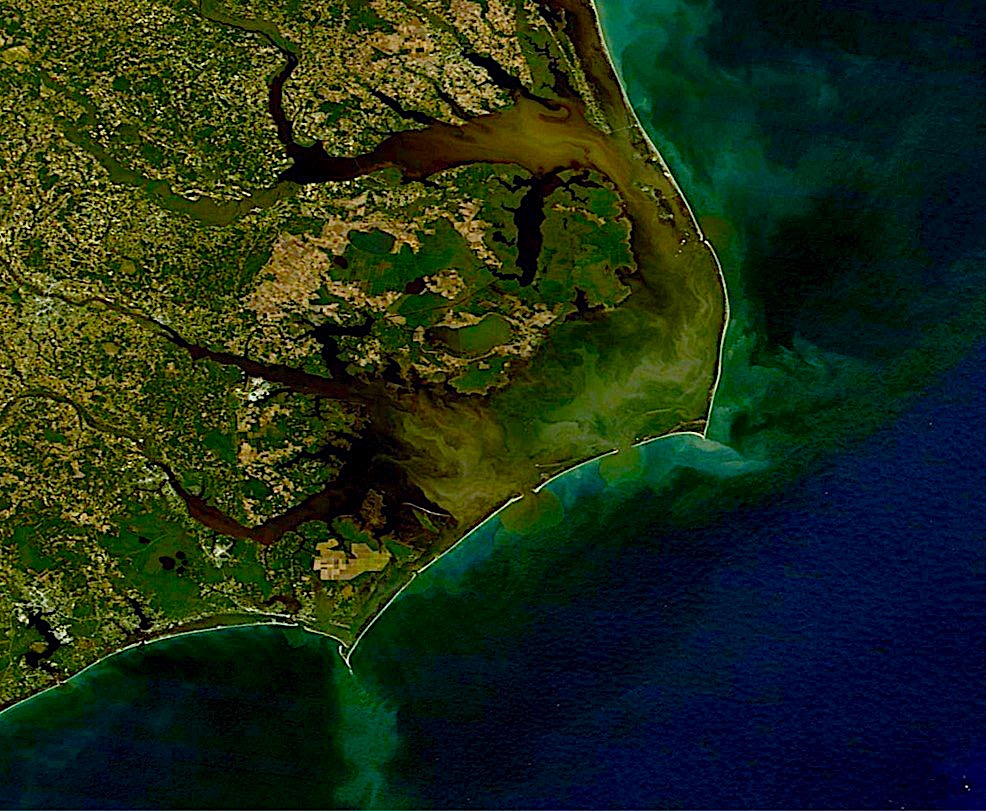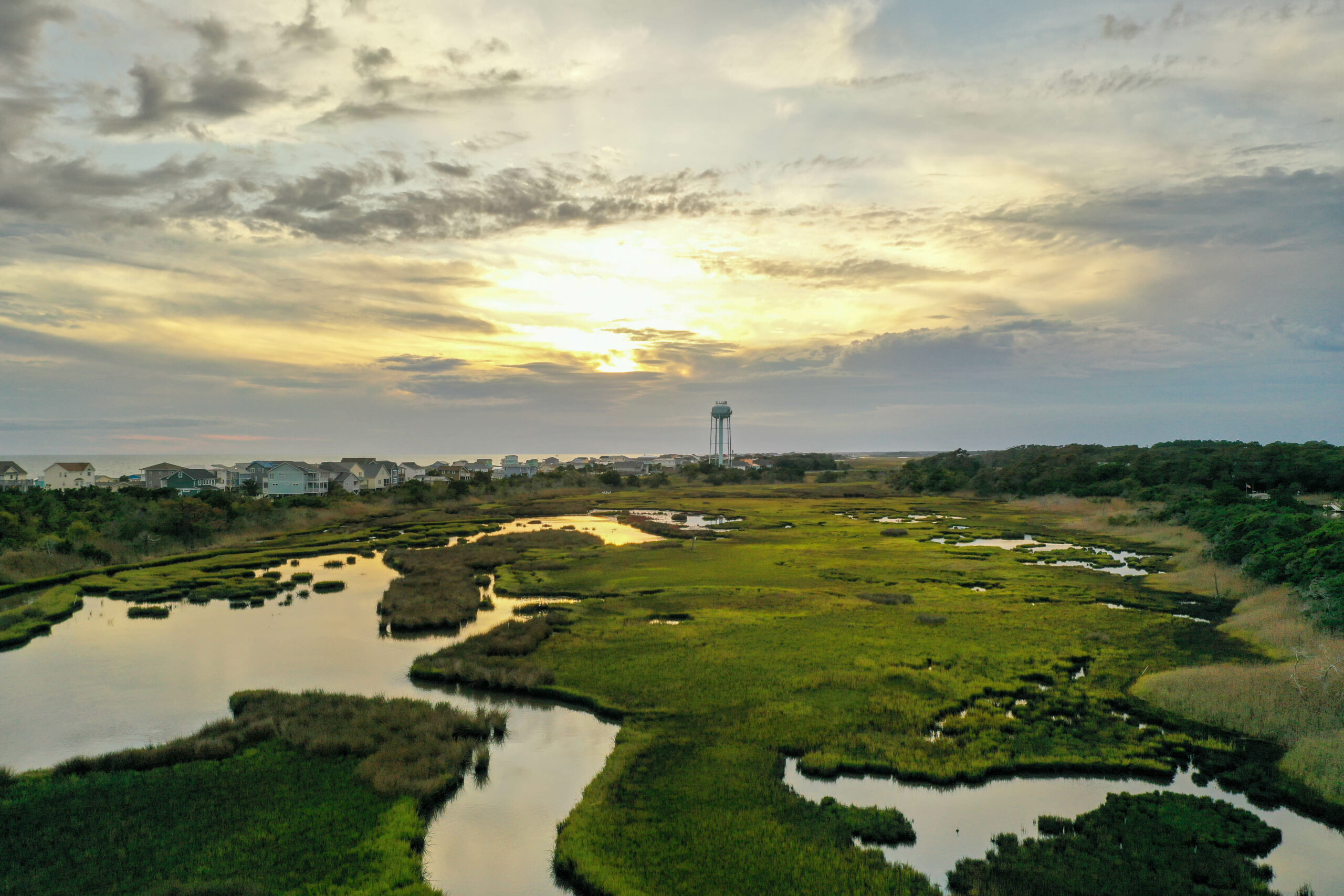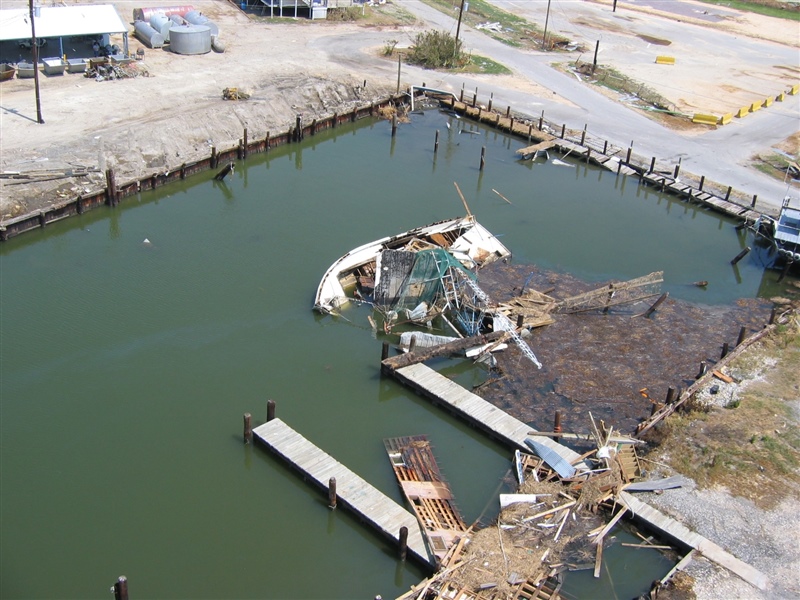As a youth in suburban Long Island, Michael Voiland was pulled to Brooklyn — home of his beloved Dodgers and his large extended family.
But at age 14, his parents bought a cottage in Riverhead, on Long Island’s eastern end. A friend invited him to go fishing there. “This was foreign to me,” he explains. “I figured Long Island Sound was pretty much a ‘dead sea.'”
Within a few castings, Voiland had caught a striped bass along the sound’s shoreline. “I was awed by what I saw,” he recalls. “It was my environmental epiphany.”
While he didn’t give up on baseball or family gatherings, he did begin spending more and more time exploring the nooks and crannies around the sound. Those adventures would lead to college, graduate studies and three decades of conserving natural resources across New York State.
Voiland’s learning adventures now are focused on North Carolina’s coastal waters — and communities that depend on those waters. On July 1, he became North Carolina Sea Grant’s new executive director.
Longtime friend Jim Murray says that much like a 14-year-old exploring Long Island, the Michael Voiland of today will focus intensely on learning everything he can about North Carolina’s coastal issues and resources — and he will be a quick study.
“He will give 110 percent,” explains Murray, former extension director for North Carolina Sea Grant and now acting deputy director of the National Sea Grant College Program.
“I am absolutely confident — based on his 30-plus-year track record — he will dedicate himself to making North Carolina Sea Grant as good as it possibly can be,” adds Murray.
DOWN ON THE DOCKS
True to his nature, Voiland dove into his undergraduate studies at the State University of New York at Albany. “I took every course that related to geography, cartography and biological resources,” he recalls.
He stayed in Albany for a master’s degree in geography, and then moved to the SUNY College of Environmental Science and Forestry at Syracuse University for his doctorate in natural resources management.
It was at Syracuse where he met Murray, a master’s student who joined him on a research project. “He was really my mentor on that project,” Murray says.
To begin his career, Voiland responded to a Cornell University posting for a Sea Grant extension specialist on the Great Lakes. He had seen specialists in the field, and thought: “That looks like the ‘funnest’ job.”
He got the job and was stationed at SUNY Brockport on Lake Ontario. “I loved that job,” he says. “I was extending university research information — and constantly learning about coastal communities.”
In one case, Voiland worked closely with researchers and stakeholders to determine the movement of salmon and trout — new fisheries to the area because of stocking programs. But what he read in textbooks regarding freshwater lakes did not fit with what he and others saw on this Great Lake.
‘To help the shoreline economy, charter boat captains and recreational anglers needed to figure out where those fish would be during different seasons,” he says. Combining research and extension, Voiland concluded that Lake Ontario’s spring “thermal bar” and other temperature-related water features were keys to tracking the whereabouts of salmonids.
“The thermal bar sets up, and then moves offshore,” he explains. Thus anglers could look for temperature changes as clues to find fish.
“Now with coastal observations, you can go to a Web site and apply that information,” he says, adding that he is eager to see how offshore anglers in North Carolina use similar real-time Web resources.
In 11 years as a specialist, he was most proud of efforts to improve waterfront access, including organizing Rochester’s first Harbor Forum.
In 1977, the city’s traditional commercial/industrial waterfront was getting run down as the harbor’s bulk products business declined. “The city didn’t know what opportunities to promote,” Voiland recalls.
He was eager to help city, county and local leaders explore options of a revitalized harbor focused on sportfishing and recreation. The change was not immediate, but a decade later, businesses and local governments had taken major steps in that direction.
For many years, Voiland was the captain of E/V Ontario, an educational vessel donated by the marine trades industry. “It was a tool for his educational programming,” explains Dale Baker, current extension program leader for New York Sea Grant.
“He gets a lot of credit for getting the charter industry going,” Baker adds, citing Voiland efforts to “professionalize” the industry by offering educational programs on safety, as well as emerging onboard technologies.
In 1988, Voiland would be offered a position at Cornell to become New York Sea Grant’s extension program leader — to guide the staff not only along the Great Lakes, but also in the marine regions.
But before he left his Great Lakes post, lawmakers recognized his extension work in State of New York Legislative Resolution, Senate No. 489, which, in part, notes:
… Dr. Michael P. Voiland distinguishes himself as a gifted individual, generously and enthusiastically participating in the countless endeavors, and
… whereas, Dr. Michael P. Voiland possesses that rare combination of temperament, intellect, dedication and energy that all who have worked with him have come to respect and admire;…
…now therefore be it resolved that this Legislative Body pause in its deliberations to honor and congratulate Dr. Michael P. Voiland…
IDENTIFYING IMPACTS
From his new office at Cornell, it would be a six-hour drive southeast to the tip of Long Island, a four-hour drive west to Fredonia near Lake Erie, and another five-hour drive northeast to locations along the St. Lawrence River.
“It is a large program and very spread out,” Voiland says, recalling days before e-mail and video conferencing. “There was a challenge in making the staff members feel like one staff.”
Under Voiland’s leadership, extension staff members took new perspectives on their roles. “Rather than a two- or three-county focus, he encouraged them to move to broader regional programming,” Baker explains.
When Bob Malouf moved from director of New York Sea Grant to director of Oregon Sea Grant, Voiland stepped in as interim director during the search process, a job he held again a few years later.
By 1994, Voiland determined he especially enjoyed sharing the program’s “success stories” with officials on the state and federal level. He requested a five-month leave from Sea Grant to work in Cornell’s Office of Governmental Affairs.
That leave was extended, and eventually he made an official transfer. But he still worked closely with Sea Grant, as the program fell within his governmental affairs work for the College of Agriculture and Life Sciences.
In addition, Voiland worked to advance federal support for other Cornell programs funded by the National Oceanic and Atmospheric Administration, as well as the U.S. Department of Agriculture, which funds the Cooperative Extension and the Agricultural Experiment Station. Other programs included those funded by the U.S. Environmental Protection Agency, National Science Foundation and U.S. Geological Survey.
During his six years in government affairs, Voiland worked on the national Sea Grant reauthorization bill in Congress — identifying “champions” from across New York to speak on behalf of Sea Grant. Of the state’s 31 members of the House of Representatives, 26 signed on to letters supporting reauthorization.
To Voiland, that level of support reflects the value of Sea Grant to inland districts as well as those along the Great Lakes or marine waters. “The whole delegation was supportive,” he says. “I hope that will be the case in North Carolina.”
In 2000, Voiland determined that although he appreciated the process and protocol of government affairs, he missed the close connection with stakeholders, as well as the development of research and extension programs. “I cut my teeth in extension as a specialist,” he explains.
He moved to a position that combined duties as assistant director of Cornell Cooperative Extension and assistant director of the university’s Agricultural Experiment Station — an effort to better integrate the programs.
There, Voiland worked to establish channels of stakeholder input to help decide what research is “needed, valued and relevant.” He also coordinated establishment of five “program councils” and the organization of more than three dozen “program work teams” — each of which included research faculty, extension professionals and people outside the university.
Those work teams would only be formed through a “petition” from a group that had representatives from all three perspectives. The teams — focused on topics such as aquaculture, fruit, biodiversity and human-wildlife conflicts — were successful enough that when limited operational funding was cut, a majority of the groups found ways to continue meeting, developing and delivering programs, and providing suggestions for strategic plans.
FINDING BALANCE
Although many of the lessons learned in New York shape his perspective, Voiland explains that he does not plan to bring any immediate changes to the program here.
“North Carolina Sea Grant is a gem of a program,” he says, citing veteran staff that are recognized as the best in their field, as well as talented new staff members.
And Voiland has the opportunity to occasionally consult with former directors Ronald Hodson and B.J. Copeland. “They will be a tough act to follow — and I will listen to any advice they might lend.”
While Voiland’s official duties at North Carolina Sea Grant did not start until July 1, he participated in the program’s 30th anniversary symposium, and took a trip to the Outer Banks with Hodson in late June.
“I was impressed with how much credit and respect all parties — public and private — clearly give to North Carolina Sea Grant,” he says.
Voiland found similar situations when he visited extension staff, researchers and partners in Wilmington and Morehead City to see coastal resources and issues first-hand. “There is a complex array of pressures — natural and man-made,” he adds, “and an impressive pool of marine research talent to address those pressures.”
Voiland will leam more as he chairs the Waterfront Access Study Committee, authorized recently by the N.C. General Assembly.
As he settles into life in North Carolina, Voiland also carries another title: newlywed. He and Nancy Fey were married in May.
“We’re looking forward to venturing to all parts of the state and truly making North Carolina our new home,” she says.
Add in the mix keeping up with his daughter, Doria, who will graduate from Cornell in December, and a variety of hobbies, and Mike Voiland has a full schedule. That is just the way he likes it.
“I feel that it’s key to maintain a balance between one’s professional, domestic and personal lives. Most everybody I’ve met or worked with in the university research and outreach arena — and especially in the natural resources field — is so hardworking and dedicated. Sometimes, it’s to a fault in that they ignore their own needs to refresh, to rest, to grow, and to recreate who they are, or can become,” Voiland explains.
“I try to do things for my own renewal: I enjoy my special car, going to car shows, playing zydeco music, cooking and restaurant hopping, taking the occasional fishing or boating trip, following the fortunes of my alma mater in football and basketball, and sampling craft brews with my wife, Nancy. And a cigar on very special, rare occasions doesn’t hurt either.”
Thus, for example, Voiland hopes to eventually take his keyboard to Carteret County to jam with N.C. Marine Fisheries Commission member Barbara Garrity-Blake, who plays guitar and rubboard in the Cajun/zydeco band, Unknown Tongues.
His interests may be many and varied, but Voiland takes them all in stride. And while she is equally busy, Nancy Voiland says they are good complements. “He loves to cook, and I love to bake. It’s a great combination,” she says. “He feeds me pasta, and I feed him chocolate.”
While Mike Voiland’s “environmental epiphany” continues to guide his professional career, he still has a spot in his heart for baseball. Although he can recall details from his first Dodgers’ game at Ebbets Field with his father in 1956, the team left him for California. He then slowly started pulling for the Yankees with an equal, if not stronger, fervor.
And now he has a chance to sample minor league baseball — right here in North Carolina.
To download an interview with Michael Voiland that appeared on UNC-TVs “North Carolina Now,” go to http://ncseagrant.ncsu.edu/ and follow links in the “News” section.
This article was published in the Autumn 2006 issue of Coastwatch.
For contact information and reprint requests, visit ncseagrant.ncsu.edu/coastwatch/contact/.



